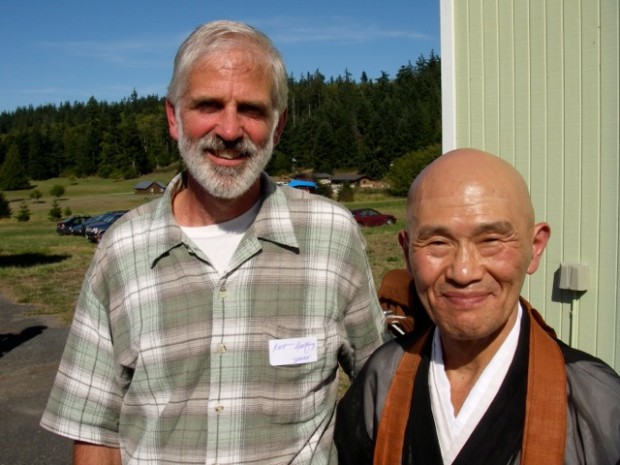 As I write this, my jet is just lifting off from Seattle-Tacoma, headed for San Francisco and Osaka, Japan. Puget Sound is fading into the mist and fog and rain of this early March morning. It will still be winter when I get to Sogenji.
As I write this, my jet is just lifting off from Seattle-Tacoma, headed for San Francisco and Osaka, Japan. Puget Sound is fading into the mist and fog and rain of this early March morning. It will still be winter when I get to Sogenji.
My final MBSR class with King County employees concluded last night. As always, I was moved by the quality and depth of closing reflections from participants as we went around the circle of twenty-five people, sharing what has been valuable about this eight-week journey into mindfulness. One said, “I used to be caught in my reactivity, and I didn't even know it. Now I see that I really can turn my reactions into responses – that I have choices – and this has made all the difference.” Another said, “I am so much calmer now. I was really stressed when I started the class. Those stesses are still there, but I don't get pulled into them nearly as much. It's hard to put into words.” Another said, “It gives me comfort to run into colleagues from this class now, and to know that we share this bond. I don't feel so alone, and I feel better able to be present to my work.” Another said, “I was really disconnected from my body before. It was like me and my body were two. Now I do the body scan every day on the bus when I'm riding to work. I feel more calm when I get there, and I am really learning how to listen to my body. It makes a huge difference.”
Watching these insights take root in my students is inspiring. But I have also been feeling a need to take a break from teaching, and to go deeper again into my own practice. This is a trip I've been wanting to take for a long time, though I feel some apprehension going into it – a full month of intensive practice, mostly in silence. I've never done more that a week-long silent retreat before.
My motivation for going to Sogenji is still a bit murky. I'm a little surprised that I'm actually doing it. Mostly, my decision stems from my retreat with Harada at Tahoma Zen Monastery on Whidbey Island last September, when I felt a fresh connection to my teacher – fresh motivation to stay within the Zen stream. For the next month I will go by the name that Harada gave me. I will be "Shinkai", which means "mind of ocean". Chisan emailed me from Sogenji yesterday that Harada has mentioned several times to her that, “Shinkai is coming,” each time with a smile. The story I have been telling myself for so many years that I am a lousy Zen student, that Harada doesn't take me seriously as a student, is obviously not true. Harada takes me much more seriously than I take myself. My job on this trip, and in moving forward from here, is to get out of my own way, so that the deep possibilities that Harada sees in me, and that are in everyone, can find freer and more heartfelt epression in my life. This is important not just for me, but for everyone that my life comes in contact with.
As both a Zen student and MBSR teacher, I feel myself perched on a rich, fertile intersection between traditional Buddhist training, and the exploding world of applied mindfulness in Western culture. It is messy and chaotic and beautiful and absolutely necessary. The discontinuities between the two feel much smaller to me than they used to. Could it be that all this elegant form and effort comes down to simply learning how to do this continuously in our everyday lives? I think so. But as the “mindfulness revolution” kicks into high gear, the question of integrity looms large. It is not nearly as easy to do this as pop culture is prone to suggest. Through my own ongoing practice and teaching, I have developed a more visceral understanding of how challenging it is to bring mindfulness into the marrow of our everyday lives, because I see how hard it is for me to do it skillfully and continuously. The layers of resistance and delusion never give way to clarity for long.
I have no idea if this trip to Japan will yield fruit, and what form that fruit will take. I'm simply following a hunch that this is what I need to do right now. I am trying to enter this time, as Suzuki Roshi used to suggest, "without a gaining idea." And while reading and writing will mostly be on the back burner during this time, I'll try to weigh in a couple times in the coming weeks with some of what I am learning.
